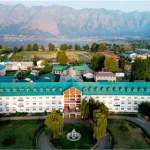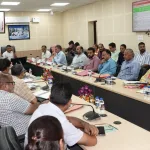Srinagar, June 12: People from several areas of Budgam and Srinagar outskirts have expressed concern over the deterioration and pollution of Doodh Ganga River, which is a major tributary of the Jhelum.
The river which passes through many villages of Budgam and Srinagar enters the Hokersar wetland. The river is also a source of drinking water for many areas of Budgam and Srinagar.
However, over the past several years, the river has been polluted at several places and people throw waste and sewage into it and it is losing its sheen.
Javid Ahmad, a resident of Srinagar said at several areas of Bemina, Srinagar people continue to throw waste into it and the sewage also makes its way to the river.
“It has also become a victim of illegal encroachments on its embankments due to urbanization. It can cause waterborne diseases when the water is used for drinking purposes,” he said.
The resident said the major damage is caused to the river from Rambagh to Narbal and many sewage pipelines have been diverted into the river which is causing its degradation.
Javid also said that unregulated practices at many places should be banned and there should be zero tolerance to the pollution of such water bodies.
People who live around the Hokersar wetland said the silt and waste of Doodh Ganga finally enters the wetland hitting the flora and fauna.
Ghulam Hassan, a resident of Soizeth said that the pollution, throwing of waste and open sewage into the water body has affected flora and fauna of the river.
He said that a lot of waste comes from the water of Doodh Ganga which has affected the flora and fauna of Hokersar wetland as Doodh Ganga passes through the wetland.
“Over the past 20 years, the wetland has witnessed changes and it has further degraded due to pollution and garbage. This was a source of livelihood for us and it was also a source of fodder for the livestock of the area,” he said.
“We appeal to the Lieutenant Governor to take cognizance of pollution of the river and do the needful to save it,” the resident said.
The resident said that due to the lack of sanitation measures and unregulated pollution it has taken a toll on the glory of the river. “The silt that has accumulated in the wetland should be cleaned and cleared on priority so that the water body is restored,” he said.
The locals said untreated sewage is still finding its place into the river at several places and it is a major problem saying that the government should take appropriate measures for the same.
Regional Director, Jammu and Kashmir Pollution Control Board, Rafi Ahmad Bhat there were three main issues: solid waste, sewage and sand mining. “The Pollution Control Committee took action against 34 violators and fined Rs 29 lakh from them,” he said.
“We are also doing water analysis at five places. When the river enters the city limits the water quality degrades further,” he said. The Regional Director said they are monitoring the water quality on a monthly basis wherever there are issues.
“At many places, the solid waste has been removed and cleared. People have been given awareness to save it further,” he said.
“Last time, we prepared an action plan which included short and long-term measures and those are all achievable and if these are done in a time-bound manner things will change,” Bhat said.
“Whatever measures are needed should be done on a priority basis as the river is the lifeline for people. I am hopeful that the concerned departments will take action,” he said. “We are also apprising the concerned authorities about the measures from time to time,” he added.





